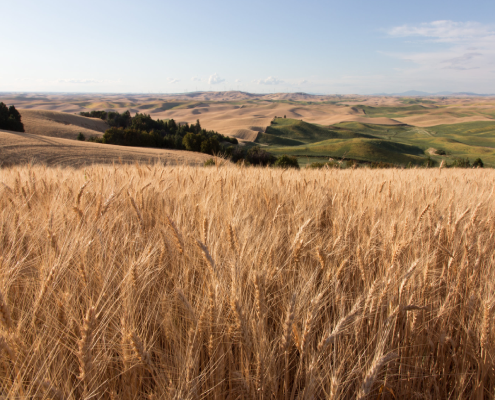“Food is the moral right of all who are born into this world.” – Dr. Norman Borlaug, Nobel Peace Prize Laureate and wheat scientist
Wheat is the source of 20% of the world’s caloric intake and a dietary staple worldwide. It is an excellent source of energy-providing complex carbohydrates, fiber, B vitamins and iron. The U.S. wheat industry is proudly committed to global food assistance and encourages strategies that include the full range of options to help countries attain lasting and sustainable food security.
WHY DO WHEAT FARMERS CARE ABOUT FOOD AID PROGRAMS?
U.S. wheat farmers have been partners in U.S. international food assistance programs for more than 60 years and take pride in sharing their harvest with populations that need it most. Learn more about why wheat farmers care about these programs in U.S. Wheat Associates (USW) handouts on food aid and wheat monetization.

USW board members and state wheat commission staff have made multiple trips to Africa to see programs using wheat in action. Ron Suppes, a wheat farmer from Kansas, (pictured above, second from left), shared his experience and opinion on these programs in his testimony to the House of Representatives Committee on Agriculture, which is shared here. Nicole Berg, a wheat farmer from Washington, also shared about her experience on a podcast, shared here.
HOW MUCH WHEAT IS DONATED THROUGH FOOD AID PROGRAMS?
The United States donated an average of more than 800,000 metric tons (MT) of wheat as food aid each year from 2016 to 2020. Classes of wheat used as food aid include hard red winter, hard red spring, soft white and soft red winter. The U.S. Agency for International Development (USAID) and the U.S. Department of Agriculture (USDA) report their commodity usage in the annual International Food Assistance Report.
HOW ARE WHEAT FARMERS INVOLVED IN FOOD AID PROGRAMS?
The U.S. Wheat Associates Food Aid Working Group (FAWG) includes farmer board members and state wheat commission staff who want to ensure food aid programs are used effectively and continue their essential work overseas. Specifically, that commitment is guided by the following resolutions:
- Promote wheat as a nutritious component of international food aid.
- Support funding of P.L. 480 Title II food assistance programs at $2.5 billion, the full amount authorized by law.
- Support a strong, flexible U.S. food aid program that contains both in‐kind donations and monetization.
- Support funding and implementation of LRP programs through the Foreign Disaster Assistance Act and USAID.
- Support USDA administration of Food for Progress.
- Encourage an increase to the Food for Progress Transportation Cap and efforts to mitigate the effect of Cargo Preference rules on cost recovery calculations.
- Support the U.S. government’s agricultural development initiatives as a supplement to existing emergency and non-emergency humanitarian assistance programs such as P.L. 480 Title II programs.
See FAWG’s Principles here.
HOW DOES USW WORK WITH USDA AND USAID ON FOOD AID?
U.S. Wheat Associates (USW) works with USAID, USDA and non-governmental organizations on issues impacting wheat in food aid programs.
Just as there are different wheat foods, there are different wheat classes and characteristics that are appropriate for those foods. Providing the right wheat to make the most suitable food for a recipient is a significant consideration in food aid donations.
Wheat donations do not distort local markets as most food aid recipients are net importers of wheat, particularly in Africa. USW works to ensure that wheat is used appropriately in these programs.
For more information:
HOW DOES USW WORK WITH PVO and NGOS?
U.S. Wheat Associates (USW) works closely with the Private Voluntary Organization/Non-Governmental Organization (PVO/NGO) community to encourage the use of wheat in monetization programs where appropriate.
USW assists PVOs and NGOs looking to monetize wheat with the market characteristics and, most importantly, correct specifications such as protein and moisture content to ensure that each donation is the best fit for that market.
NGOs and PVOs submitting proposals for food aid that include wheat in their development projects may request a letter of support from USW and obtain free input on the appropriate wheat class and quality specifications to use for the targeted country by contacting USW Director of Trade Policy Peter Laudeman.
WHAT ELSE IS THE UNITED STATES DOING TO PROMOTE FOOD SECURITY AROUND THE WORLD?
U.S. Wheat Associates (USW) strongly encourages efforts to promote food security worldwide, including through the funding in the Global Food Security Act, USAID’s Farmer to Farmer program, and CGIAR partnerships. Read more about those efforts:



